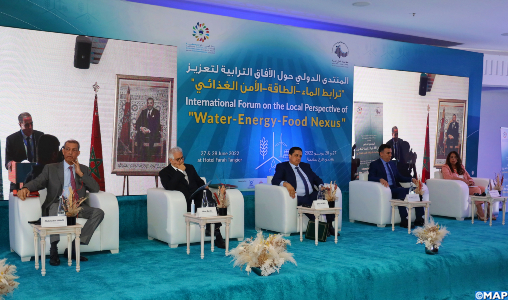The objectives of Morocco’s transition to a low-carbon economy by 2050 as set in the National Strategy for Sustainable Development (NSSD) were highlighted Monday by Minister of Energy Transition and Sustainable Development, Leila Benali.
In a video message to the International Forum on the local perspective of the “NEXUS Water-Energy-Food Security” held in Tangier, the minister said that this Nexus fits perfectly with the strategic directions of the New Development Model (NMD) and the NSSD, which now sets clear objectives for the transition of Morocco to a low-carbon economy by 2050.
These objectives include building resilience, human development, reducing social and territorial inequalities, mitigation and adaptation to climate change, and environmental protection, she explained.
In this regard, Benali noted that several initiatives have already been undertaken to promote this Nexus, such as the regional coastal plans aimed at laying the groundwork for integrated management, the territorial climate plans and the national program of solar pumping that will help rationalize the use of resources.
She also noted that the Tangier-Tetouan-Al Hoceima region has considerable potential in wind energy and a strategic position at the heart of an energy crossroads and gas, especially with Europe.
The region has a total operational capacity of 400 megawatts (MW) of wind power, i.e. about 30% of the capacity installed today in wind energy, with an additional capacity of 320 MW being developed.
In a presentation before the forum, Minister of Equipment and Water, Nizar Baraka, pointed out that the integrated management of water, energy and agriculture will ensure greater efficiency and achieve sustainable development, as well as water, energy and food security, in light of climate change.
The Minister who surveyed the water policy adopted by Morocco since independence pointed out that the development of the water sector requires additional energy resources, in view of climate change and the reduction of water resources, due to an increasing demand for water in the agricultural field.
This situation requires the mobilization of additional energy-consuming water resources (desalination of seawater to produce around one billion m3 per year, transfer of excess water and connection of basins), which requires integrating these projects, very expensive in terms of energy, in the national energy strategy, in particular in the program of renewable energies.
Baraka called for an overhaul of water and energy management by adopting an integrated approach, in order to find solutions based on an integrated assessment of the challenges and the unification of the opportunities offered by the sectors of the water and energy, emphasizing the need to ensure water efficiency and energy efficiency in the areas of industry, tourism and construction, among others.
The two-day international forum, held by the Tangier-Tetouan-Al Hoceima Regional Council and the Mediterranean Climate House, aims to understand the long-term impacts of the water-energy-food security nexus on growth. It also aims to discuss ways to improve coherence between national, regional and local planning and priorities, as well as the importance of promoting private sector investment in the Nexus.
The program of this event features several sessions and panels on “the opportunities of the Nexus at the territorial level”; “experiences sharing between Mediterranean territories”; “the integration of the Nexus in territorial policy”; and “the accessibility of funding and financial package.”



